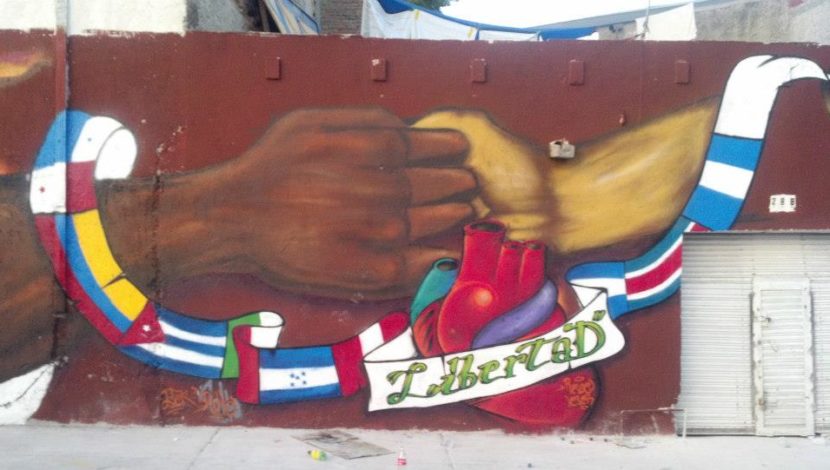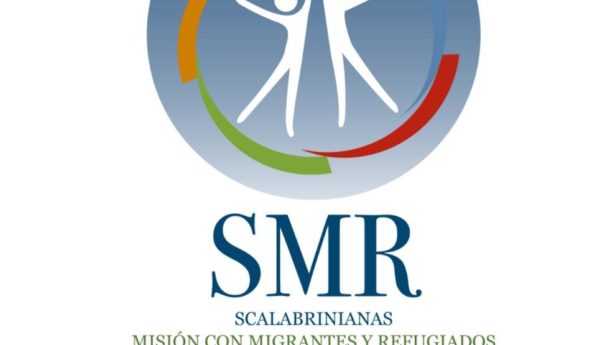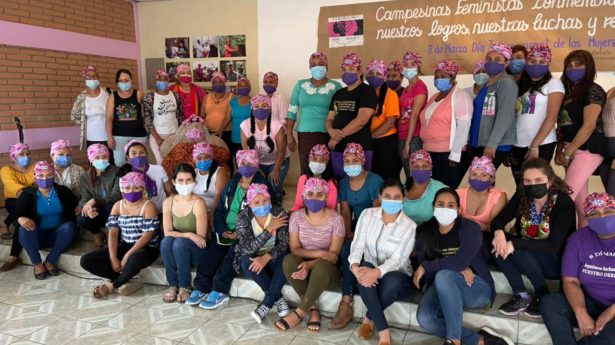The Unitarian Universalist Service Committee advances human rights through grassroots collaborations.
“The Light of Hope”: A Reflection from UUSC Partner FM4 Paso Libre 1 Year After the COVID-19 Lockdown (Part 1)

By Lindsey Hoemann on April 14, 2021
This interview was an opportunity to reflect on lockdown during the last year, how their services have changed, and how the shelter continues to move forward with its work given the demands on its resources.
UUSC: What services does FM4 provide at the shelter? Prior to March of last year, before the pandemic hit, what was your work like and what were the difficulties or challenges you faced? Were there other significant events that you were responding to at the time?
FM4 Paso Libre: The activities carried out by FM4 Paso Libre before the COVID-19 pandemic are listed below. We describe each of the six units that make up our organization as well as their most significant actions. We will then discuss the necessary changes that each unit underwent in the context of the COVID-19 pandemic.
I. Center for Attention to Migrants and Refugees Unit (CAMR)
The Center for Attention to Migrants and Refugees Unit is in charge of the humanitarian aid provided at the shelter, which is known as the Center for Attention to Migrants and Refugees (CAMR). Among its activities are supervising volunteers, receiving donations, and maintenance of the CAMR. In addition to offering humanitarian care for the people in migration that we serve, we also provide clothing, food, and telephone calls to their communities of origin or destination.
For FM4 Paso Libre, this area of work represented a large operational challenge. The most significant change to this area of work was making modifications to the humanitarian assistance provided to people in migration that receive our services. Before the COVID-19 pandemic, the organization worked under the following care model:
a) Any person—regardless of the country they were in prior to encountering our shelter—as long as they were in migration of any kind could benefit from the humanitarian services of FM4 Paso Libre for a period of three nights and four days.
b) If, during that time, the person demonstrated the need for legal, medical, or psychological support, the Comprehensive Care Unit (CCU) would conduct an in-depth interview to determine if FM4 Paso Libre could accompany the person in need as they are provided services. If so, their stay at the shelter could be extended to a maximum period of 60 days.
This changed dramatically on March 18, 2020. On this date, the state government announced, “The suspension and postponement of mass events and face-to-face classes for secondary education, as a preventive measure against the coronavirus.” FM4 Paso Libre, in accordance with this announcement, carried out two actions that modified our operations. First, we suspended the entry of any new people into the shelter. Second, we allowed the people who were inside the shelter (around 45) to remain there, in order to protect themselves and spend the duration of the COVID-19 pandemic in the shelter.
Additionally, we modified our operations in order to continue providing humanitarian assistance to people in transit who knocked on our door. We adapted our processes so that we could provide the basic services of food, clothing, cleaning and sanitation in the entranceway. We also implemented actions such as mandatory hand washing and changing of facemasks prior to entry, as well as wearing masks while they receive services.
II. Institutional Development Unit
The Institutional Development Unit is the body that leads the financial, administrative, human resources, accounting, and fundraising processes for the organization.
One of the main changes that took place was in fundraising. As the pandemic progressed, donations by cash or bank transfer decreased, a trend which continues to date.
At the same time, donations received during 2020 were subject to an additional audit by the Mexican government through the Tax Administration Service. The objective was to determine which donations were used to alleviate the COVID-19 pandemic (cleaning supplies, masks, among other things).
III. Comprehensive Care Unit
The Comprehensive Care Unit is in charge of three significant activities. The first is the coordination and implementation of the Local Integration Project for asylum-seekers in Guadalajara, in partnership with the United Nations High Commissioner for Refugees (UNHCR); the second is the coordination of medical and psychological care for all people in migration in the CAMR.
One of the most significant changes in this area was converting the medical and psychological volunteer work to virtual or telephone visits. It cannot be overlooked that the saturation of public health institutions due to the COVID-19 pandemic meant that medical follow-up care for people in migration who were at the CAMR was postponed or, in some cases, suspended.
At the same time, we experienced an increased need for mental health care within the shelter, as well as for people that the organization continues to accompany in their respective processes of integration into the city. Some of these people stated that they were beginning to experience stressful situations as a result of the COVID-19 pandemic. Another phenomenon that we documented was the precariousness of working conditions; in some jobs the employers decided to reduce salaries or in some cases even terminate the employment of their migrant workers as a result of the COVID-19 pandemic. This meant that several people in migration and refugees (some of them with families) did not have sufficient resources to pay rent, which forced them to live on the streets.
It should be noted that the educational services administered by the Mexican state are suspended and elementary, secondary, and university classes continue to be held virtually and remotely. However, in the case of the National Institute for Adult Education (INEA, in Spanish), the office for the state of Jalisco—where FM4 is located—suspended all activity without setting up remote electronic classes. This has resulted in a delay in the educational projects of the people in migration that we serve, mainly those who, due to their age, have not been able to take traditional coursework.
IV. Legal Assistance Unit
The Legal Assistance Unit is in charge of providing advice and, where appropriate, legal representation in non-jurisdictional, administrative, and legal procedures required by people in migration who request assistance in the CAMR. In addition, through our legal clinic, we coordinate the work of the paid and non-paid team members (volunteers, university students doing social service work, and interns).
The main challenge posed to this area of our work was the legal accompaniment of people in migration and refugees, since the main Mexican state institutions with whom the NGO interacts, such as the Mexican Commission for Refugee Aid (COMAR, in Spanish) and the National Migration Institute (INM, in Spanish), suspended their work due to the pandemic. This led to major delays in the paperwork for the people that our legal team accompanies. Likewise, the INM suspended procedures for “assisted returns” (a euphemism for deportation), which forced people that decided to return to their countries of origin to do so on their own. Finally, for those persons subject to international protection, family reunification procedures were suspended by the Ministry of Foreign Relations.
V. Political and Social Advocacy Unit
The Political and Social Advocacy Unit is in charge of connecting with regional, national and local actors, as well as doing grassroots work with the community close to FM4 Paso Libre such as schools, churches and universities.
The most significant change that this area faced was the method of connecting with political actors, which is now done through virtual formats. This eventually increased the workload. At the same time, some of the meetings with the various political actors became repetitive, which was exhausting.
Connection with the government was limited, largely because the priority was to address issues arising from the COVID-19 pandemic. In some cases, support was offered by government actors and international organizations for the population that we serve. However, this support was at the beginning of the COVID-19 pandemic and lasted for a short time.
Finally, virtual work with schools required a learning curve and at times it costs more to follow up with students, an example of this being the option for university students to do their obligatory social service work virtually. Lastly, churches also closed their facilities, thus reducing the scope of our relationship with them.
VI. Dignified Inclusion Project Unit
The Dignified Inclusion Project is a joint effort with AVSI, an Italian NGO that does humanitarian work in Mexico focused on Children. Presently, our organizations are carrying out a project to create a model of educational and psychosocial care for children in migration in four shelters, two located in Jalisco and two located in the state of Oaxaca.
Faced with the COVID-19 pandemic, we have had to modify the activities and schedule of this project. Among the most significant changes was the implementation of activities to support the shelters, as well as the families that are accompanied by them, through deliveries of food supplies. Meanwhile, activities we had planned to host in person were turned into virtual events.
UUSC: As the arrival of the pandemic and the seriousness of the situation became evident, what were the immediate responses by FM4? In those days and weeks, what was the atmosphere like in the shelter? How did the people who were staying there react? How did the volunteers and collaborators feel in this scenario?
In the beginning, the atmosphere was one of anxiety and concern. Since it was a new disease, there was no complete information on how the virus behaved, what actions are effective to prevent its spread, and what actions are not.
Regarding the experience of people in migration who were in the shelter, some expressed to us their sadness and frustration that with the upcoming quarantine, their immigration procedures were suspended, which also put on hold the possibility of obtaining formal employment, necessary to continue their process of fully integrating into the city.
In part two of the series, FM4 Paso Libre staff share their thoughts on the state of Mexico’s response to the pandemic, the nation’s public health system, and how residents of the shelter are staying strong in the face of the continued pandemic.
***
About UUSC: Guided by the belief that all people have inherent worth and dignity, UUSC advances human rights globally by partnering with affected communities who are confronting injustice, mobilizing to challenge oppressive systems, and inspiring and sustaining spiritually grounded activism for justice. We invite you to join us in this journey toward realizing a better future!
Photo Credit: FM4 Paso Libre

